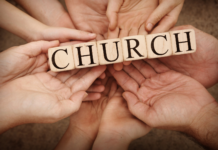I find the biggest challenge as a pastor is being a listener. My dad would always say this: He who talks less wins. As a pastor I feel like I have to have something to say, but I have learned to ask questions and just listen. That’s what people want: to be heard. They don’t need me to try to find a solution to their problems; they just need me to hear them. Listening is a long-term process, and it has to begin in the church. It has to begin with us as pastors.
We can preach about unity and quote scriptures all day, but to add something from a personal experience that we’ve heard from them goes further than any message we could ever preach. I found the value of just being a listener and intentionally scheduling time with people of different colors and experiences. And I would say, if you haven’t done it before, start doing it now. If your church is not diverse, go outside your circle and find somebody different from you. Maybe it’s a pastor from another area; maybe it’s a business owner or a family in the community. Whoever it is, ask the questions that will help you because we all need to be part of the solution of disunity in the church.
Every pastor should regularly check their city’s webpage, census or county page, and dig into the unique demographics of their community. In 2019 and 2020, racial tension and the COVID-19 pandemic prompted me to dig into ours more than I ever had, and in doing so I found out where the needs were and where the neglect was. Then, we as a church were able to address them.
God enabled us to meet needs that nobody else was meeting in our community! Instead of sitting back and dealing with the obvious, we found ways to be intentional and proactive, and we connected with other organizations and churches to help meet real needs in a way that brought honor to God and showed love to our neighbors.
Because COVID-19 created such great needs, we were able to facilitate the distribution of food to our city and its surrounding areas. We got our church members to come out and help in the food distribution, and we even had local employers and the fire department participate. Many lives were touched through the outreach!
The Bible says to make the most of every opportunity because the days are evil. One day, I was pondering that: “Are there more opportunities because the days are evil? Or during evil days, are we to press in for more opportunities?”
My church decided to be aggressive in seeking out opportunities during the pandemic, and it’s helped us to create unity among our members and walk in a greater purpose. We are committed to working together to meet the needs of our neighbors, and we have been blessed with many opportunities as a result!
Now, nothing happens without prayer. We’ve always had a strong emphasis on prayer, but you can always do more and pray more strategically. With all this meeting of community needs, we began to implement more prayer opportunities, both as a congregation and personally. We put out a prayer list that included specific request like praying for unity, our city leaders and our church, but I really felt God speak to my heart to begin to pray for diversity.
If you’re praying for unity, you have to pray for diversity too and believe you’re going to get what you pray for. Praying for unity can really be a challenge, so every month now, we have made it a point to pray for diversity at all levels: racial, age, socioeconomic standing, etc. And we believe our prayers are making a difference!
I believe there’s this boldness that needs to come out in the church. We need more than the generic, “We’re gonna be praying for you,” or “Let’s pray for unity in the church.” Civic leaders and church leaders, not only should you say, “We’re praying for you,” but you need to actually find a moment to pray for them. The difference that prayer makes is hugely underestimated. Nobody’s going to turn down prayer – especially not with all we’re facing today!
Prayer is the church’s first priority. And it’s the thing that’s going to help us navigate the times we’re in together. If we don’t create a greater sense of purpose and unity than others, then our church members and community members are going to pursue their own purposes in place of God’s purpose for their lives.
I’m trying to get better at clarifying my church’s purpose. I believe that doing so will create change, not just within my church family but also within our community. We can rally around the right purpose, especially if that purpose comes from the truth, God’s Truth. Absolute truths cannot be denied by men!
Unity is purpose-driven, not people-driven or problem-driven. It keeps us from spending energy and resources on things that are unnecessary to our mission. This is why we as pastors must clearly state our purpose and inspire our people to love the purpose we lay out before them. When they do, they’ll come to love each other as well.
So how do we start? We find the common ground of purpose and then allow reconciliation to begin, whether it be reconciling to God and with each other within the church or reconciling others within the community to God. It is a ministry of everybody and to everybody. That is what we’re all about at Tree of Life Church! We want to join together in pursuit of a common purpose which enables us to open doors cross-culturally, cross-city, for a common good. Our goal is to act as a catalyst for reconciliation.
Pastor, look to the new and look for the new thing God is doing, and you’ll find your church’s true purpose. Then communicate it to your people so that they too can develop a passion for the things dear to God’s heart.







